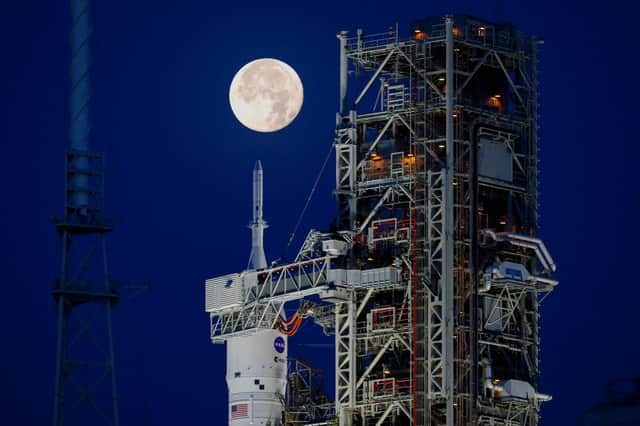Artemis Moon Mission: why has Nasa pushed back the dates for its own venture after private mission fails


Nasa's moon missions have dimmed in excitement after the space agency delayed its Artemis timeline in order to learn from test flights and make safety a “top priority”, it has announced.
The space agency said it has a number of areas where improvements could be made in order to ensure people can safely travel to the moon.
Advertisement
Hide AdAdvertisement
Hide AdNamed after the Greek goddess of the Moon and sister to the god Apollo, namesake of Nasa’s first Moon missions, the Artemis programme will see the construction of the Lunar Gateway – a new space station where astronauts will be able to live and work.
As part of the programme, Nasa had planned to return astronauts to the surface of the Moon in 2025 – the first time since the last Apollo mission in 1972, but Nasa administrator Bill Nelson said safety was a “top priority”, and as such, the Artemis 3 mission was now being pushed back to September 2026.
November this year had been pencilled in for Artemis 2, which would see the first scheduled crewed flight of Nasa’s Orion spacecraft, currently planned to be launched by the Space Launch System. However, this mission has been postponed until at least September 2025.
In December 2022, Nasa’s Orion capsule splash-landed in the Pacific after completing a 2.25 million km (1.4 million miles) test flight to orbit the Moon, paving the way for the next generation of manned lunar missions. The spaceship was launched aboard the Artemis 1 rocket on 16 November from the agency’s Kennedy Space Centre in Florida.
Advertisement
Hide AdAdvertisement
Hide AdMr Nelson said: “Safety is our top priority and to give Artemis teams more time to work through the challenges with first-time developments, operations and integration, we’re going to give more time on Artemis 2 and 3. So what I want to tell you is we are adjusting our schedule to target Artemis 2 for September of 2025, and September of 2026 for Artemis 3, which will send humans for the first time to the lunar South Pole.
“Artemis 4 remains on track for September 2028. And though challenges are clearly ahead, our teams are making incredible progress.”
Amit Kshatriya, deputy associate administrator, Moon to Mars Programme, Exploration Systems Development Mission Directorate, explained that one of the issues being looked at was small pieces of the heatshield coming off the capsule during re-entry of Artemis 1. Other issues affecting the programme include issues with batteries, the development of new spacesuits, the progress of SpaceX’s Starship – the need for propellant transfer, and the need for numerous landings.
Mr Nelson was asked whether he was concerned the delays would mean China landing astronauts on the Moon before the Artemis programme. He replied: “I really do not have a concern that China is going to land before us. I think that China has a very aggressive plan. I think they would like to land before us because that might give them some PR coup, but the fact is that I don’t think they will. I think it is true that their date that they announced keeps getting earlier but specifically with us landing in September of 26, that will be the first landing. We don’t fly until it’s ready – safety is paramount. So whether we fly in September 26, and land – regardless of the question about China – we don’t fly until it’s ready.”
Advertisement
Hide AdAdvertisement
Hide AdThe announcement comes after the most recent attempt to land on the Moon had to be abandoned as Astrobotic’s Peregrine Mission One (PM1) encountered a fuel leak shortly after launching into Space on Monday after the spacecraft was aiming to become the first private mission to land on the lunar surface. But shortly after separating from United Launch Alliance’s Vulcan Centaur rocket, the Astrobotic team found that Peregrine was struggling to achieve a stable position pointing towards the Sun. Astrobotic is the first of three US companies to attempt to send a spacecraft to the Moon as part of Nasa’s Commercial Lunar Payload Services initiative.
Comment Guidelines
National World encourages reader discussion on our stories. User feedback, insights and back-and-forth exchanges add a rich layer of context to reporting. Please review our Community Guidelines before commenting.
